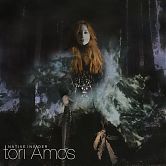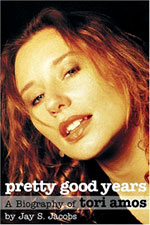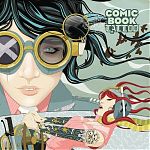- Articles
- Cherries
- Minutiae
- Q&A
- RAINN
- Releases
- Reviews
- Site News
- Them
- Toriphiles
- Touring
- TV/Radio/Web
- Video
News Archives
Keep an eye on our Twitter and Facebook pages since we often post quickie updates there when we're on-the-go.
During tours, we do our best to cover setlists in real-time on Twitter. If you want to tweet a show in, just DM or @ us on the day and tell us to watch your stream that night.
Tori is touring in 2017 to support the release of Native Invader. The European legs runs from early September through early October and the North American leg runs from late October to early December. We do not know if additional dates elsewhere will be added.

Native Invader (album, 2017)

Unrepentant Geraldines (album, 2014)

Gold Dust (album, 2012)

Night of Hunters (album, 2011)

Midwinter Graces (album, 2009)
 Abnormally Attracted To Sin (album, 2009)
Abnormally Attracted To Sin (album, 2009)
Live at Montreux 1991/1992 (DVD, 2008)

American Doll Posse (album, 2007)

A Piano (boxed set, 2006)

Pretty Good Years
(bio, 2006)

Fade To Red
(DVD, 2006)
 Comic Book Tattoo (book, 2008)
Comic Book Tattoo (book, 2008)News: The Huffington Post Interview (October 19, 2011)
So, many years on, still making records, each record is never approached casually. It’s not a casual exercise. It’s f**king ferocious. But there’s something quite sexy about it, too. It’s like I’ve heard surfers talk about riding these waves that could really wipe them out and kill them. Well, you know, making records can be like that too.
The Huffington Post’s Mike Ragogna recently chatted with Tori about Night of Hunters, working with master composers, and tricks to developing your identity as a songwriter. Thanks to mgktweety for the link.
A Conversation with Tori Amos
Mike Ragogna: Hi Tori, how are you?
Tori Amos: Hi Michael, how are you?
MR: Excellent, now that I’m talking with you! Oh, my God.
TA: (laughs) You’re funny. Where are you?
MR: I’m talking to you from Fairfield, Iowa. It’s really a pleasure.
TA: Well, thank you for having me.
MR: Tori, your new album, Night Of Hunters, is very different from many of your other albums in that it’s just you, a piano, and an orchestra, all centered around a classical theme. What inspired you to do that this time around?
TA: Well, somebody from Deutsche Grammophon approached me—that’s the classical side of Universal. This German musicologist, Dr. Alexander Buhr, found me while I was out running around the world, and he said, “Listen, I have an idea for you to consider. What about doing a 21st Century song cycle based on classical themes,” and I looked at him and said, “Can we start drinking now?” He said, “Look, it’s a challenge. I know it’s a challenge, but you’ve been writing this musical, so you should know how narrative works in a song cycle. And how many times have you been offered something like this?” I said, “Never. I’ve never had this opportunity, and if I’m going to do it, I really need you to supply me with endless amounts of classical music so that I’m exposed to more than I know myself.”
MR: Were there specific pieces that resonated with you more than others?
TA: Well, yes—those are the ones that made the record. And there were a few others that did resonate, but with the story you’re always thinking, “Okay, this has to have a beginning, a middle, a denouement, and an end,” so I had to make some tough choices and the Chopin piece kept coming back to me. It’s funny how these pieces start stalking you, because they do. They really, really do. Honestly, you’ll be sitting there watching a movie and eating popcorn, and all of a sudden, there it is again! There’s the Schubert piece in the room, and you think, “Where’d you come from?” That might sound a little “is that how it really happens,” but what is key here is that the songs demand you to respect them, and yet a lot of them wanted to be in this 21st Century expression even though most of them are over a hundred years old.
MR: Tori, what was it like listening back to this song cycle when it was finished?
TA: I had listened to Schubert’s “Winterreise—” I just talked to the German, and anytime I say “Winterreise,” I get corrected on how it’s supposed to be said; I studied it, realizing how the structure needs to work. It’s very different from a musical, but there are similarities. And so, what was kind of key was deciding, “Okay. If this is going to be a Cathedral—if we look at the song cycle like a sonic Cathedral—then how do we build this thing?” What was key was getting “Shattering Sea,” which opens the story, setting it up like a cliffhanger, and then bringing in another character that would take us into the story further. So, I designed a character, Anabelle, which is kind of a mythic, Irish representation of the Triple Goddess or nature, or however you want to see it.
MR: The narrative comes off so beautifully as it goes. Now, you mentioned the musical you’ve also been working on, The Light Princess.
TA: It’ll have a different name, but the musical is inspired by George MacDonald’s The Light Princess. I’ve been working on it for five thousand years, yes. (laughs)
MR: (laughs) So, this album really did go hand in hand with the concept of how you’re creating at this moment.
TA: Well, yeah. I think that Deutsche Grammophon was correct in that I wouldn’t have been able to approach a 21st Century song cycle if I hadn’t been hammered by the whole musical-writing process, and with such an incredible creative team that I’ve been lucky enough to be working with. They’re at the British National Theatre. This team is connected to them in some way. So, I’ve been cutting my teeth on narrative in a really disciplined way, and I’m thankful for it, though there are some dark days during the musical process. But, it really helped me to be in a place where I could understand what this Deutsche Grammophon person was talking about when he said, “Why don’t you write a song cycle, but based in the 21st Century…and remember, song cycles can travel in time and do anything you want, as long as you have your foundation clear.” So, I think I understood that architecture finally. After all these years—at 47—I was ready to take up the challenge.
MR: Are there artists—classical composers—that you have a better feel for now, as opposed to before you did the project?
TA: Oh yeah, completely. I mean, I feel that way about all the composers that are on this project. Each song is a variation on a theme except for one, which was inspired by another piece, and it’s all notated on the record what the original themes are and where they come from. I’ve always had a soft place in my heart for Schubert, but once I got “Star Whisperer,” that was really the first one that came that was complete. It’s nine and a half minutes. Once I knew what that was, then I started throwing away all kinds of things that I was working on, because they just weren’t good enough. I realized, “Okay, this is the benchmark, this Schubert variation. Everything has to live up to that.” So, that was kind of a breakthrough moment.
MR: When you create—even before this project and before starting work on the musical, say back even as far as Little Earthquakes—what is your process for the creation of a song?
TA: The one thing you have to have is a delicate ruthlessness. You have to, or you can’t hear correctly. You have to be able to listen to what’s coming through the cosmos. Say you’re walking down a street in San Francisco and you see something and because you see it, it translates to sound for songwriters. So, seeing means you’re hearing. When I can hear something, that’s how I really understand it, and I know that might sound strange to you, but you’re dealing with a form of songwriting ether—it’s etheric—and you’re having to take this and make it tangible. So, having said all that, going back to Little Earthquakes, you have your instrument, whatever that is—for me, it’s a piano—and sometimes, you just play to understand what you’re feeling. But then, once you do that, you can’t leave it there. This is where the delicate ruthlessness comes in. You can’t just say, “Oh, because I was feeling that, it’s great.” No, it’s usually not. Then, you have to get out your chisel and you need to start sculpting it into something, into a form. That’s the art form of songwriting.
MR: One of my favorite Tori Amos songs is “Silent All These Years.” It affected me very deeply when I heard it, I couldn’t believe I was hearing those words come out on the radio. Do you know where that moment of inspiration came from, and do you think back on how great it was?
TA: Well, I think my whole life had been leading up to that moment. It’s one of those things where I had been writing for a long time before that success. So, it didn’t just come overnight—I mean, that was 27 years of work, as I’d started playing at two or two and a half. So, it all culminated into that after many, many, many—I mean hundreds of songs—had been written. They might not have all been copywritten, but had been written. Then when Little Earthquakes, that body of work, was coming out, it wasn’t as if that was my first go. That’s how the world might’ve seen it, but it came after many, many, many, many years of songwriting.
MR: Everything on that record was very pointed and poignant. It had this “You’ve GOT TO listen to this” quality.
TA: Yeah, that was the idea for that record.
MR: Your recordings in general demand attention. Is it intentional?
TA: Well, I think that making records is its own sort of—hmm, what do you say—what would it be like in surfing terms? Like surfing a huge 25-foot wave…a 30-footer. I think in making records, you can get locked into some kind of dimension where you don’t know if you’re gonna make it out alive. A lot of people have made records and that’s it—they’ve never made them again, or they’ve made a couple, they’ve had a success, and then it’s done. The thing about making records is that it’s a real discipline. You have to be able to stay focused, knowing when the magic is there. You can play something a hundred times and there’s no magic and you can’t explain why, but you just know when you’re listening back. There’s that elusive something, that sparkle, that something that makes you want to play it again. Like, “Could you play that again?” It’s very difficult to define these things, but a good producer begins to eyeball it. It’s almost like you have to be a hunter and you can hunt that frequency down and the tone of it, and you have to know when you have it and when you don’t. I usually have a team around me, it’s not just me, it’s never just me. It’s always about a team when you’re making records, I think, and it’s about pulling different people together at different times to make music together. So, many years on, still making records, each record is never approached casually. It’s not a casual exercise. It’s f**king ferocious. But there’s something quite sexy about it, too. It’s like I’ve heard surfers talk about riding these waves that could really wipe them out and kill them. Well, you know, making records can be like that too. Surfers lose their lives. I don’t mean to belittle their experience, but I’ve known many musicians that love to surf and would say, “The difference in your analogy, T, is that we could die.,” and what I would say is, “Yes, but how many musicians careers have died because they make the wrong record.”
MR: Interesting perspective, really. Now, in the past, you got to work with the great Arif Marden. That must have been a marvelous experience.
TA: Yeah, I must say, I’ve been so fortunate to work with so many amazing people over the years. I’ve been really, really blessed. I also love working with Ahmet Ertegün, who is related to Arif. Ahmet Ertegün danced with me at my wedding. His wisdom was so…he really gave me some amazing advice over the years.
MR: I imagine that this team you’ve surrounded yourself with has not only contributed to your music and your records, but also to your life.
TA: Yes, absolutely.
MR: Considering your incredible catalog, what advice do you have for new artists?
TA: Like what kind of advice?
MR: What should a new artist do, creatively, to further their adventure?
TA: Well, you have to be clear on what your style is and you have to embrace that style, and if you’re not loving it, then you need to expand it. And you can always expand what I call your palette. But you have to keep expanding your chord vocabulary, and if you’re a songwriter, your structure, because the problem now in the 21st Century is how many times have you listened to the radio and thought, “Oh, wait a minute. That song sounds like this other song that sounds like this other song.” See, now you’re coming down the food chain in the 21st Century, and a lot of writers have come before you who have written in possibly similar structures, so it’s challenging, but new artists have to have even more in their arsenal than they did fifteen years ago if you’re going to be original. You need to play with structures, and not just listen to the radio of today, you need to go back to some of the great masters and look at their chord progressions, because it’s a bit different from the derivative that you hear all the time right now. I don’t mean what you hear all the time and everywhere, but you do with the obvious Top 40 stuff.
MR: Well, that cycles right back to your approach on Night Of Hunters, your classical song cycle and exploration of the great works of the last few hundred years. I really do appreciate your time, Tori. It’s been very special for me and I’m sure for the readers. Thank you again.
TA: Thank you. All the best.


